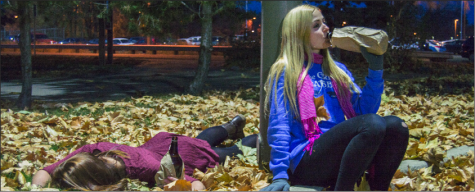MIP charges carry significant impact on student life
November 20, 2014
For underage students at Central, being caught in possession of alcohol can result in either a court date or a date with Student Rights and Responsibilities.
Greg Margheim, a bike patrol officer for Central Police, has worked for the university department for two years. He said that officers who catch minors in possession (MIP) have the option of issuing citations which can result in one of two possible outcomes.

“I can either cite them with a crimination citation, which requires them to go to court,” Margheim said. “Or you can be cited with the pre-charging diversion program.”
Central Police is the only department in Ellensburg which issues pre-charging diversion citations.
Richard DeShields, associate dean of students, said that the role of Student Rights and Responsibilities is primarily to educate under-age students about drugs and alcohol.
He said that this education occurs whether there has been an incident report filed by the police or by the resident assistants on campus.
“Our job is to meet with students and talk with them about the ramifications of their decisions,” DeShields said. “So we’ll meet with students and get their perspective, and then potentially hold students accountable.”
Margheim said that the most common days for MIP citations, and alcohol citations as a whole, are Thursdays, Fridays and Saturdays. However, he said that incidents are not limited to those times.
“I can tell you I’ve written MIPs on a Tuesday at nine o’clock in the morning,” Margheim said. “With students walking to school, walking to class with a beer.”
Margheim said since the loss of fraternities and sororities on campus, MIP citations have also gone down, and credits the city’s noise policies for this decline. He also said that recently, there has been a greater amount of MIPs with marijuana instead of alcohol.
The issue of minors possessing alcohol is not limited to Central’s campus. It also manifests itself at local businesses, such as Safeway and Fred Meyer.
A former Fred Meyer employee, who wishes to remain anonymous due to Fred Meyer’s policies about talking to the press, expanded on some of the techniques used by the store to prevent minors from purchasing alcohol.
“As far as management, they really stress that you verify every single aspect of the ID,” the anonymous source said. “The birth year, whether it’s expired, whether it’s actually that person. But at the same time, there weren’t very many people that we had to turn away. There weren’t very many minors that have tried to go through with fake IDs.”
The anonymous source said that he had witnessed Fred Meyer employees selling alcohol to underage persons.
“People have been terminated for that, though,” the anonymous source said.
Despite the fact that at Fred Meyer selling liquor to minors is a terminable offense, the anonymous source said that they were unable to give an exact number of employees terminated for that offense.
“You’re not really supposed to talk about things like that there. If you talk about anyone being terminated, you yourself are eligible for termination,” the anonymous source said.
The anonymous source also said that one of the red flags employees are trained to look for is suspicious behavior by one or more of the customers purchasing alcohol.
“The biggest problem with minors trying to buy alcohol is just them trying to get their friends to do it for them,” the anonymous source said. “The minors here are college aged kids. They’re a little bit more intelligent than the high school aged kids.”
While it is generally a crime for minors to possess and consume alcohol, the Washington State Liquor Control Commission (WSLCC) makes some exceptions.
According to the WSLCC website, it is legal for Washington state minors to be given alcohol for consumption by a parent, guardian, physician or dentist for medicinal purposes. These would include cases in which minors were given alcoholic beverages with their family meal.
DeShields said that Central enforces their own policy as well as the state and federal policies. As such, Central essentially treats every MIP the same.
The WSLCC website also states that any minor seeking medical attention for alcohol poisoning, for themselves or for others, cannot be charged based on information offered during any medical attention.
As for any business that sells alcohol to minors, the WSLCC can issue citations. Such sales, which are a gross misdemeanor, can result in a verbal or written warning to the business.
If the offense is more serious, or the business is a repeat offender, the WSLCC issues administration violation notices. According to the WSLCC website, the consequence for repeat offenses by businesses is the revocation of their alcohol licenses.
DeShields echoed the sentiments of Washington law.
“The biggest concern with alcohol is that a lot of students don’t know the risky choices,” DeShields said. “We want to try to prevent a student from moving through the path of having to be hospitalized. We do see several students who have to be transferred for emergency purposes, so we really want to make sure that we’re helping students make low-risk behavior choices.”



